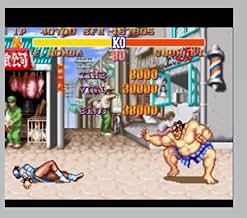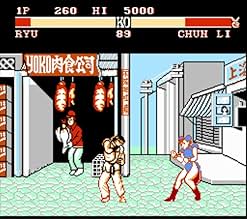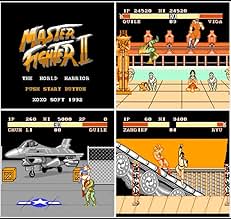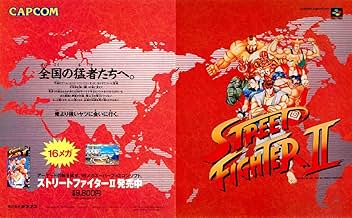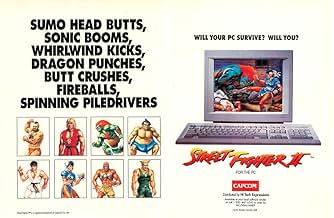Ryu, Ken and a roster of six international newcomers compete to get the chance to take on the evil dictator M. Bison, the leader of the Shadaloo organization, who plans to brainwash the best... Read allRyu, Ken and a roster of six international newcomers compete to get the chance to take on the evil dictator M. Bison, the leader of the Shadaloo organization, who plans to brainwash the best fighters to work in his organization.Ryu, Ken and a roster of six international newcomers compete to get the chance to take on the evil dictator M. Bison, the leader of the Shadaloo organization, who plans to brainwash the best fighters to work in his organization.
Featured reviews
Once upon a time, Street Fighter II had only a subtitle with no modifiers. Both a blessing and a curse, the game would go on to gain four additional releases with their own new names -- Champion Edition, Turbo, Super, and Super Turbo. This review focuses on the original arcade release of SF2 (you know, the one that showed Chun-Li in orange on the select screen?) Two men, backdropped by a skyscraper, face off against each other in the game's attract mode. One throws a punch, knocking his opponent out with that single strike. The defeated fighter falls out of frame as the screen scales up the building where finally the game's title awaits. Street Fighter II: The World Warriors. Curiously, neither character in the opening appear as a playable character in the game, itself. But never mind.
A couple of quarters and a press of the start button brings the gamer to the character select screen where eight warriors (from different parts of the globe as the title suggests) await to wreck havoc on the rest of the cast. Each character offers a distinct visual flavor to their design that differs greatly from the other combatants (Ryu and Ken, notwithstanding). E. Honda, the large sumo wrestler with quick hands and the frightening ability to send his entire mass flying at his opponent. The green monstrosity, Blanka, able to channel electricity through his skin and turn himself into a human (monstrous?) cannonball. Guile, the overpowered glitch-master who interestingly never gained much more than his flash kick and sonic boom through the later games. The sole female in the game, Chun-Li, known for her speed, her knack for jump attacks, and of course the lightning kicks. Every fighting game requires the big dumb wrestler character, and Street Fighter 2 delivers with Zangief whose dreaded SPD made any player reluctant to come close. Dhalsim, the slow poke who could breath fire, move incredibly slow, and whose limbs stretched to impossible lengths assuming he ever lands after he jumps (did I mention he was slow?). Lastly, the two carry-overs from the original Street Fighter, Ryu and Ken, who share not only the same moves, but the same sprites as well.
For the most part, all of the characters' attacks possessed unique properties that set their fighting style apart -- small details such as speed, priorities, jump heights, and animation. All these minor tweaks add up to make the characters control very differently from each other, even when characters share special moves with identical execution and similar properties. Blanka and E. Honda, for example, both have a move that launches them across the screen in a straight line; with both characters, rapidly pressing the punch button will yield another special attack (hundred-hand-slap or electricity). However, these two have very different jumping roundhouses, crouching roundhouses, crouching fierces, standing fierces (etc), which demands that the player use them differently.
While not the first fighting game, Street Fighter II made the biggest splash in arcades by introducing responsive controls that made the game feel like player skill actually mattered instead of the crap-shoot of previous fighting games (like, say, the original Street Fighter.) And in the end, the game designers wound up with more than they bargained for -- not only could players have the satisfaction of winning on account of properly inputted commands, consistently yielding the desired move. But SFII also paved the way for entire chains of special moves via buffering which lead to wicked combos capable of draining an entire life-bar (Ryu & Ken's jumping fierce, standing fierce, fierce dragon-punch instant dizzy combo.) Unfortunately, the damage in Street Fighter 2 feels terribly subjective when facing off against the computer controlled opponents higher up on the ladder (as if, in addition to fighting more intelligently, the CPU also gives the player a handicap to make things more difficult.) When I played Street Fighter 2, it always seemed as though the machine can deal out more damage in fewer (weaker) moves than the player can. Needless to say, this makes life very frustrating when CPU Ryu's weakest fireball does more damage than a jump-in roundhouse, sweep combination. That and the CPU could spontaneously unleash any move it wanted, even moves that required a two-second charge. (Guile's Sonic Boom, Flash Kick.) As the game progressed, the player would battle in each of his opponent's unique stages including a street in China, a dock in the US, an American Air Force base, a construction site in the USSR, and a small village in Brazil (to name a few.) During SF2's reign in arcades, these backgrounds proved unmatched by any game that preceded and most of the games that followed. All of them visually interesting in their basic design (I love the F-16 in Guile's stage), their music, and also in their limited animations that manage to breath life into the environments without distracting from the battles at hand.
At key points, the game would break from the fighting to offer up a few mini-games that involved raining destruction down upon a car and flaming barrels. These rampages served no purpose other than increasing the player's score (people still pay attention to those?) and giving the player a chance to do something slightly different than beating the tar out of another character.
After defeating the other seven combatants (in the original SF2, players could not fight themselves) the game introduces its four boss characters -- Balrog, Vega, Sagat (the boss of the original Street Fighter), and Bison -- each of which fight on their own turf, so four new stages in the USA, Spain, with the final two bouts taking place in Thailand. Defeating Bison (aka Vega in Japan) allows the player to glimpse his chosen character's unique ending and I think that's an appropriate place to end this review.
A couple of quarters and a press of the start button brings the gamer to the character select screen where eight warriors (from different parts of the globe as the title suggests) await to wreck havoc on the rest of the cast. Each character offers a distinct visual flavor to their design that differs greatly from the other combatants (Ryu and Ken, notwithstanding). E. Honda, the large sumo wrestler with quick hands and the frightening ability to send his entire mass flying at his opponent. The green monstrosity, Blanka, able to channel electricity through his skin and turn himself into a human (monstrous?) cannonball. Guile, the overpowered glitch-master who interestingly never gained much more than his flash kick and sonic boom through the later games. The sole female in the game, Chun-Li, known for her speed, her knack for jump attacks, and of course the lightning kicks. Every fighting game requires the big dumb wrestler character, and Street Fighter 2 delivers with Zangief whose dreaded SPD made any player reluctant to come close. Dhalsim, the slow poke who could breath fire, move incredibly slow, and whose limbs stretched to impossible lengths assuming he ever lands after he jumps (did I mention he was slow?). Lastly, the two carry-overs from the original Street Fighter, Ryu and Ken, who share not only the same moves, but the same sprites as well.
For the most part, all of the characters' attacks possessed unique properties that set their fighting style apart -- small details such as speed, priorities, jump heights, and animation. All these minor tweaks add up to make the characters control very differently from each other, even when characters share special moves with identical execution and similar properties. Blanka and E. Honda, for example, both have a move that launches them across the screen in a straight line; with both characters, rapidly pressing the punch button will yield another special attack (hundred-hand-slap or electricity). However, these two have very different jumping roundhouses, crouching roundhouses, crouching fierces, standing fierces (etc), which demands that the player use them differently.
While not the first fighting game, Street Fighter II made the biggest splash in arcades by introducing responsive controls that made the game feel like player skill actually mattered instead of the crap-shoot of previous fighting games (like, say, the original Street Fighter.) And in the end, the game designers wound up with more than they bargained for -- not only could players have the satisfaction of winning on account of properly inputted commands, consistently yielding the desired move. But SFII also paved the way for entire chains of special moves via buffering which lead to wicked combos capable of draining an entire life-bar (Ryu & Ken's jumping fierce, standing fierce, fierce dragon-punch instant dizzy combo.) Unfortunately, the damage in Street Fighter 2 feels terribly subjective when facing off against the computer controlled opponents higher up on the ladder (as if, in addition to fighting more intelligently, the CPU also gives the player a handicap to make things more difficult.) When I played Street Fighter 2, it always seemed as though the machine can deal out more damage in fewer (weaker) moves than the player can. Needless to say, this makes life very frustrating when CPU Ryu's weakest fireball does more damage than a jump-in roundhouse, sweep combination. That and the CPU could spontaneously unleash any move it wanted, even moves that required a two-second charge. (Guile's Sonic Boom, Flash Kick.) As the game progressed, the player would battle in each of his opponent's unique stages including a street in China, a dock in the US, an American Air Force base, a construction site in the USSR, and a small village in Brazil (to name a few.) During SF2's reign in arcades, these backgrounds proved unmatched by any game that preceded and most of the games that followed. All of them visually interesting in their basic design (I love the F-16 in Guile's stage), their music, and also in their limited animations that manage to breath life into the environments without distracting from the battles at hand.
At key points, the game would break from the fighting to offer up a few mini-games that involved raining destruction down upon a car and flaming barrels. These rampages served no purpose other than increasing the player's score (people still pay attention to those?) and giving the player a chance to do something slightly different than beating the tar out of another character.
After defeating the other seven combatants (in the original SF2, players could not fight themselves) the game introduces its four boss characters -- Balrog, Vega, Sagat (the boss of the original Street Fighter), and Bison -- each of which fight on their own turf, so four new stages in the USA, Spain, with the final two bouts taking place in Thailand. Defeating Bison (aka Vega in Japan) allows the player to glimpse his chosen character's unique ending and I think that's an appropriate place to end this review.
10Emphinix
1992. The year when the Street Fighter saga became very popular before every game there is today such as Turbo/Super/Alpha/Ex etc. I was 6 years old when this great game came out. Me and my siblings used to play it every day all day during the summer when I had my Super NES.
I remember that every time we used Guile because on that time, he was the MAN! Using him every time and kicking some ass with him. No matter what this will be the best Street Fighter game of all time as we die hard fans of this fighting game say.
That year was the beginning of the Street Fighter legacy before Mortal Kombat came and also rose to popularity among fans of fighting genre video games.
To me, Street Fighter owns Mortal Kombat. However in 1994, the darkest moment of Street Fighter II was when the ill fated live-action movie came out.
Street Fighter II is and always will be the absolute best.
I give this game a 10 out of 10
I remember that every time we used Guile because on that time, he was the MAN! Using him every time and kicking some ass with him. No matter what this will be the best Street Fighter game of all time as we die hard fans of this fighting game say.
That year was the beginning of the Street Fighter legacy before Mortal Kombat came and also rose to popularity among fans of fighting genre video games.
To me, Street Fighter owns Mortal Kombat. However in 1994, the darkest moment of Street Fighter II was when the ill fated live-action movie came out.
Street Fighter II is and always will be the absolute best.
I give this game a 10 out of 10
Since Capcom released Street Fighter II in 1991, this game set the standard for all other fighting games to come. This game made Capcom a household name and became popular for many years.
In this game, you can pick one of 8 fighters: Ryu Hoshi, Ken Masters, Edmond Honda, Guile, Chun Li, Dhalsim, Zangief, and Jimmy Blanka. Guide your character through an international fighting tournament and defeat the remaining seven fighters. After these fighters have been beaten, you fight the 4 grand masters, which are the leaders of the international crime syndicate Shadaloo. They are Balrog (M. Bison in Japan), Vega (Balrog Fabio la Cerda in Japan), Sagat, and M. Bison (Vega in Japan). After Bison has been defeated, you find out your character's motivation for entering the tournament in his/her ending.
It's sad that some people think that SNK, another good company, made ripoffs of SFII. Their games are just as good as Capcom's games. My favorite characters are Ryu, Ken, Guile, and Dhalsim. Street Fighter II is definitely the best fighter ever made. Viva Capcom!!!!!
10 out of 10 stars. :-)
In this game, you can pick one of 8 fighters: Ryu Hoshi, Ken Masters, Edmond Honda, Guile, Chun Li, Dhalsim, Zangief, and Jimmy Blanka. Guide your character through an international fighting tournament and defeat the remaining seven fighters. After these fighters have been beaten, you fight the 4 grand masters, which are the leaders of the international crime syndicate Shadaloo. They are Balrog (M. Bison in Japan), Vega (Balrog Fabio la Cerda in Japan), Sagat, and M. Bison (Vega in Japan). After Bison has been defeated, you find out your character's motivation for entering the tournament in his/her ending.
It's sad that some people think that SNK, another good company, made ripoffs of SFII. Their games are just as good as Capcom's games. My favorite characters are Ryu, Ken, Guile, and Dhalsim. Street Fighter II is definitely the best fighter ever made. Viva Capcom!!!!!
10 out of 10 stars. :-)
I remember playing this on the arcade when I was a little kid. And I still love it today. I mean come on Street Fighter II was a great fighting game and it still is. The first Street Fighter was a little you know cheap. But Street Fighter II is fun the graphics are great.
I loved the music because some of there stage background music almost were catchy and I still hum the SF2 themes today. The game play is great and still is today. I loved the special effects also and the new announcer's voice. I loved the opening theme for Street Fighter II.
If you are a Street Fighter newbie play this game first if you want to be a Street Fighter fan.
10/10
I loved the music because some of there stage background music almost were catchy and I still hum the SF2 themes today. The game play is great and still is today. I loved the special effects also and the new announcer's voice. I loved the opening theme for Street Fighter II.
If you are a Street Fighter newbie play this game first if you want to be a Street Fighter fan.
10/10
This was the very first videogame I ever played in my entire lifetime, if memory serves me right.
I think I played this even before learning how to learn and write properly, while I was still on kindergarten; I used to play with my mother and my older brother in a place where kids could rent videogames to play them for hours, in a time before MMORPGs went mainstream.
I had my own Blanka toy, which I carried everywhere instead of a teddy bear.
I remember when I was a kid Chun-Li and Vega used to be my favorite characters from the game, though I had no idea about the backstories or any of the actual personalities of the characters.
I even liked that cheesy Jean-Claude Van Damme movie!
While I haven't played any Street Fighter game in a very long time, Street Fighter will always remain a special place in my heart, being the reason of why I was so much into fighting games during the nineties, until Pokemon Red and Blue shifted my interest into RPGs.
I still consider the Street Fighter anime movie a great film, the same goes for the anime series.
I think I played this even before learning how to learn and write properly, while I was still on kindergarten; I used to play with my mother and my older brother in a place where kids could rent videogames to play them for hours, in a time before MMORPGs went mainstream.
I had my own Blanka toy, which I carried everywhere instead of a teddy bear.
I remember when I was a kid Chun-Li and Vega used to be my favorite characters from the game, though I had no idea about the backstories or any of the actual personalities of the characters.
I even liked that cheesy Jean-Claude Van Damme movie!
While I haven't played any Street Fighter game in a very long time, Street Fighter will always remain a special place in my heart, being the reason of why I was so much into fighting games during the nineties, until Pokemon Red and Blue shifted my interest into RPGs.
I still consider the Street Fighter anime movie a great film, the same goes for the anime series.
Did you know
- TriviaChun Li became known worldwide as the very first playable female fighting game character in the 1990s, followed up by the very first playable female martial artist in a 1980s fighting game which was Yuki from Onna Sanshirô (1985), but she was only known in Japan.
- GoofsOn the character select screen in the arcade version, Chun-Li is shown in a pink outfit, despite the fact that she fights in a blue outfit (corrected in Super Nintendo version.)
- Quotes
Guile: Go home and be a family man!
- Alternate versionsIn many versions, Chun-Li is seen to be wearing a thong under her dress. This was censored in the SNES version.
- ConnectionsEdited into Hyper Street Fighter II: The Anniversary Edition (2003)
Details
- Color
Contribute to this page
Suggest an edit or add missing content


